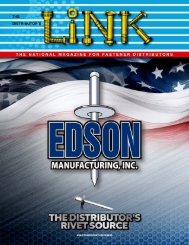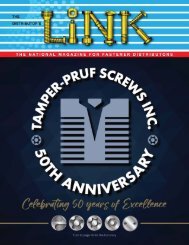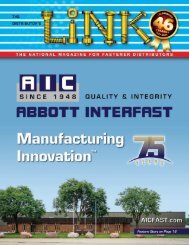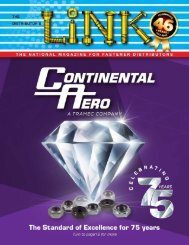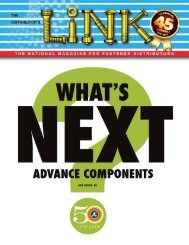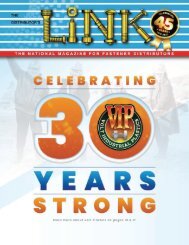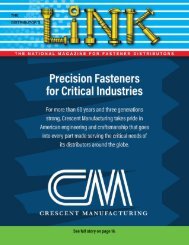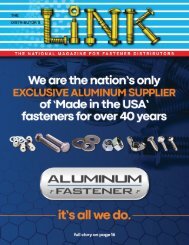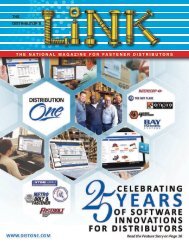SPRING 2022
Distributor's Link Magazine Spring 2022 / Vol 45 No 2
Distributor's Link Magazine Spring 2022 / Vol 45 No 2
- No tags were found...
You also want an ePaper? Increase the reach of your titles
YUMPU automatically turns print PDFs into web optimized ePapers that Google loves.
70<br />
THE DISTRIBUTOR’S LINK<br />
Roman Basi<br />
Roman Basi is the President of The Center for Financial, Legal & Tax Planning, Inc. Roman<br />
graduated from Milliken University obtaining a Bachelor’s of Science Degree with a minor<br />
in Psychology. He earned an MBA from Southern Illinois University with an emphasis<br />
in Accounting and recevied his JD degree from Southern Illinois University. Roman is a<br />
licensed CPA as well as being a licensed attorney in Illinois, Missouri and Florida and is<br />
in high demand for his expertise in financial, legal and tax matters. His areas of expertise<br />
include mergers and acquisitions, contracts, real estate law, tax and estate planning.<br />
SECTION 1202 STOCK: HOW TO EXCLUDE UP TO $10<br />
MILLION ON THE SALE OF YOUR BUSINESS! - PART 2<br />
The title of this article is NOT a typo, that’s right...<br />
up to $10 Million United States Dollars can be excluded<br />
from the sale of a business if certain parameters are met.<br />
Business owners should take note of the very important<br />
requirements that allow the exclusion of up to $10 million<br />
in federal tax. Section 1202 is an EXTREMELY beneficial<br />
portion of Internal Revenue Code and so long as the<br />
correct rules are followed, the exclusion is easy to apply.<br />
Section 1202 is also referred to as the Small<br />
Business Stock Gains Exclusion. The Section only applies<br />
to qualified small business stock acquired after Sept. 27,<br />
2010, that is held for more than five years. The Protecting<br />
Americans from Tax Hikes (PATH) Act of 2015 was passed<br />
by Congress and signed into law by President Obama. One<br />
tax benefit, made permanent by the Obama presidency, is<br />
the Small Business Stock Capital Gains Exclusion found<br />
in Section 1202 of the Internal Revenue Code. The intent<br />
behind Section 1202 is to provide an incentive for noncorporate<br />
taxpayers to invest in small businesses in the<br />
United States.<br />
Before 2009, this provision of Section 1202 excluded<br />
50% of capital gains from gross income. To stimulate<br />
American small businesses, the American Recovery and<br />
Reinvestment Act increased the exclusion rate from 50%<br />
to 75% for stocks purchased between February 18, 2009,<br />
and September 27, 2010. The latest revision to Section<br />
1202 provides for 100% exclusion of any capital gains<br />
if the acquisition of the small business stock was after<br />
September 27, 2010. Also, the treatment of no portion of<br />
the excluded gain is a preferential element for alternative<br />
minimum tax (AMT) purposes. The capital gains that<br />
are exempt from tax under this section are also exempt<br />
CONTRIBUTOR ARTICLE<br />
from the 3.8% net investment income (NII) tax applied to<br />
other investment income. The amount of gain that any<br />
shareholder can exclude under Section 1202 is limited to<br />
either $10 million or 10 times the adjusted basis of the<br />
stock. The taxable portion of a gain from selling a small<br />
business stock has an assessment at the maximum tax<br />
rate of 28%.<br />
As previously discussed, not all small business<br />
stocks are lucky enough to qualify for the tax breaks under<br />
Section 1202. There are very stringent requirements that<br />
must be followed with regards to qualified small business<br />
stock. Those requirements are as follows.<br />
[1] It was issued by a domestic c-corporation other<br />
than a hotel, restaurant, financial institution, real estate<br />
company, farm, a mining company, or business related<br />
to law, engineering, or architecture. Note: while Section<br />
1202 does not speak to an LLC taxed as a c-corporation,<br />
a Private Letter ruling by the IRS allowed Section 1202<br />
treatment for an LLC that chose to be taxed as a<br />
c-corporation.<br />
[2] It was initially issued after August 10, 1993 in<br />
exchange for money, property, or as compensation for a<br />
service that was rendered.<br />
[3] On the date of the stock issue and immediately<br />
thereafter, the issuing corporation had $50 million or less<br />
in assets.<br />
[4] The use of at least 80% of the corporation’s<br />
assets is for the active conduct of one or more qualified<br />
businesses.<br />
[5] The issuing corporation does not purchase any<br />
of the stock from the taxpayer during a four-year period<br />
beginning two years before the issue date.<br />
CONTINUED ON PAGE 144



